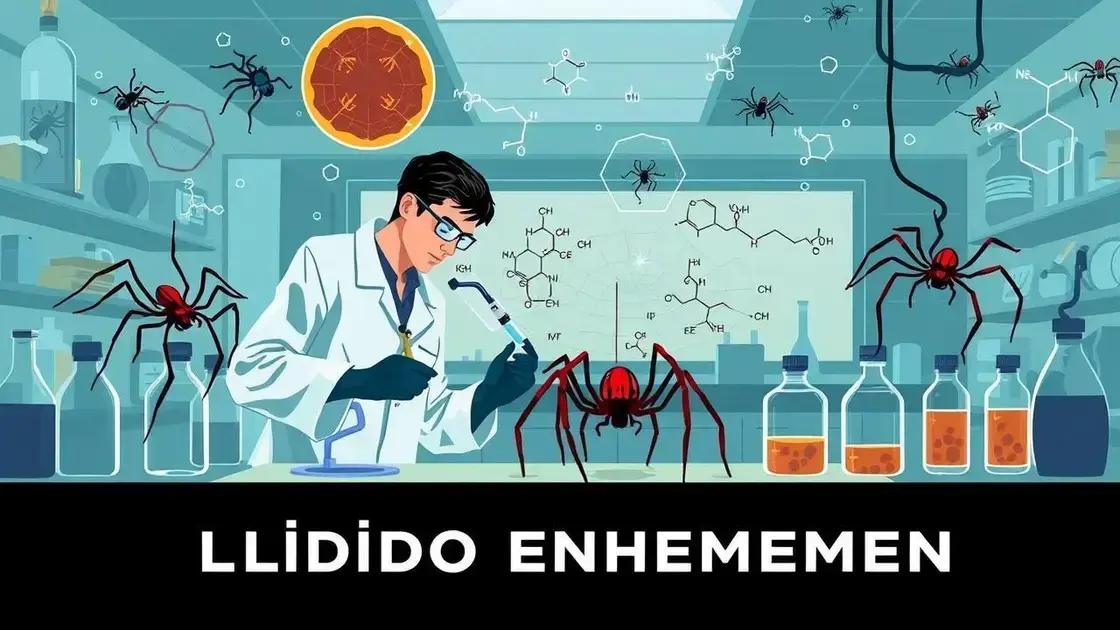The idea that the Spider Venom Trick can boost sexual desire is intriguing, as spider venom contains compounds that may influence neurotransmitters related to arousal. However, scientific research on its effectiveness is limited, and potential risks must be considered before use.
Have you ever wondered if unusual substances might hold the key to enhancing sexual desire? The intriguing concept of the Spider Venom Trick has emerged in discussions surrounding libido. This article delves into what spider venom actually does, the science supporting its effects on sexual desire, and whether it could be a viable option for those interested in boosting their libido. Join us as we explore this fascinating topic in detail.
Understanding Spider Venom and Its Effects

Spider venom is a fascinating substance that varies widely across different species of spiders. It contains a complex mix of proteins and enzymes that serve as a means to paralyze or kill their prey. Many people do not realize that these venom components might have interesting effects on the human body.
Composition of Spider Venom
Spider venom primarily consists of peptides, which are short chains of amino acids. These peptides have various biological activities, such as neurotoxicity, anti-inflammatory effects, and antimicrobial properties. Some researchers believe that certain peptides in spider venom could influence human physiology.
How Spider Venom Affects Body Functions
When spider venom enters the body, it interacts with the nervous system by binding to specific receptors. This interaction can lead to changes in neurotransmitter release, which may alter mood and physical sensations. Some studies suggest that these effects could potentially enhance feelings of arousal.
Research on Spider Venom and Libido
While there is limited research directly linking spider venom to increased sexual desire in humans, the biological mechanisms at play present intriguing possibilities. If components of spider venom can alter neurotransmitter levels, they might also influence libido, opening new areas of study in sexuality and wellness.
Overall, understanding spider venom and its effects requires more research. There is still much to learn about how such substances can affect human biology and whether they can be harnessed for potential benefits, such as boosting sexual desire.
The Science Behind Sexual Desire

Sexual desire is a complex interplay of biology, psychology, and environment. It involves hormones, brain chemistry, and emotional connections. Understanding these factors can help people grasp the science behind what drives sexual attraction and desire.
The Role of Hormones
Hormones such as testosterone and estrogen play a significant role in sexual desire. Testosterone is often linked to increased libido in both men and women. Higher levels of this hormone can lead to more intense sexual arousal and interest.
Neurotransmitters and Sexual Arousal
Important chemicals in the brain, known as neurotransmitters, also contribute to sexual desire. Dopamine, for example, is associated with pleasure and reward, making it crucial for sexual arousal. On the other hand, serotonin can have a dampening effect on libido. Balancing these chemicals is essential for healthy sexual function.
The Importance of Emotional Connection
Beyond biology, emotional factors play a vital role in sexual desire. Feelings of love, trust, and intimacy can enhance arousal and deepen connections between partners. Stress and anxiety, however, can negatively affect desire, leading to challenges in intimate relationships.
Overall, the science behind sexual desire is multifaceted, involving hormonal signals, brain activity, and emotional bonds. Each of these elements can influence how individuals experience and express their sexual interest, leading to variations in desire across different situations.
Is Spider Venom a Viable Option for Libido Enhancement?

As researchers explore the possibilities of enhancing sexual desire, the question of whether spider venom could be a viable option comes into play. The unique composition of spider venom presents intriguing potential benefits for libido enhancement.
Potential Mechanisms of Action
Certain components of spider venom, such as peptides, might influence sexual arousal by modulating neurotransmitters in the brain. These peptides could mimic or block certain receptor sites, affecting mood and arousal levels. However, the exact mechanisms remain under investigation.
The Current State of Research
Research on the use of spider venom for libido enhancement is still in its infancy. While some studies suggest that venom constituents may impact bodily functions, no conclusive evidence supports their effectiveness specifically for enhancing sexual desire in humans. Most of the findings come from animal studies, highlighting the need for extensive clinical trials.
Considerations and Risks
Although the prospects are fascinating, using spider venom for libido enhancement raises concerns. The potential for adverse effects and allergic reactions cannot be overlooked. Ingesting or using products based on spider venom must be approached with caution, as more research is needed to ensure safety and efficacy.
Ultimately, while spider venom presents a novel approach, its viability as a libido enhancer is still uncertain. Adequate scientific validation is essential before considering it a suitable option for those looking to boost their sexual desire.
Exploring the Potential of Spider Venom for Boosting Sexual Desire
The intriguing relationship between spider venom and sexual desire has opened new avenues for exploration in the field of libido enhancement. While initial findings suggest that certain components of spider venom may influence arousal by interacting with neurotransmitters, the research is still emerging.
As we consider the viability of spider venom as an option for enhancing sexual desire, it is essential to weigh the potential benefits against the risks involved. Further research and clinical trials are needed to understand the safety and efficacy of such treatments.
Ultimately, the science behind sexual desire is complex, and while the spider venom trick presents an exciting possibility, it remains crucial to approach such options with caution and informed decision-making.
FAQ – Frequently Asked Questions about Spider Venom and Sexual Desire
What is spider venom and how does it affect sexual desire?
Spider venom contains unique compounds that may influence neurotransmitters in the brain, potentially altering sexual arousal.
Is there scientific evidence supporting the use of spider venom for boosting libido?
Current research on spider venom’s effectiveness for enhancing libido is limited and primarily based on animal studies, requiring more clinical trials.
What are the risks associated with using spider venom for enhancement purposes?
Using spider venom can pose risks such as allergic reactions and unknown side effects, making cautious evaluation essential before use.
Are there alternative methods for enhancing sexual desire?
Yes, various options like therapy, lifestyle changes, and natural supplements can also be explored for boosting sexual desire.
How can I stay informed about new research on spider venom and libido enhancement?
Following scientific journals, reputable health websites, and expert publications can provide updates on ongoing research and findings.
Is spider venom safe to use in any form?
At present, the safety of spider venom for human use has not been fully established, and it should only be approached with caution.













